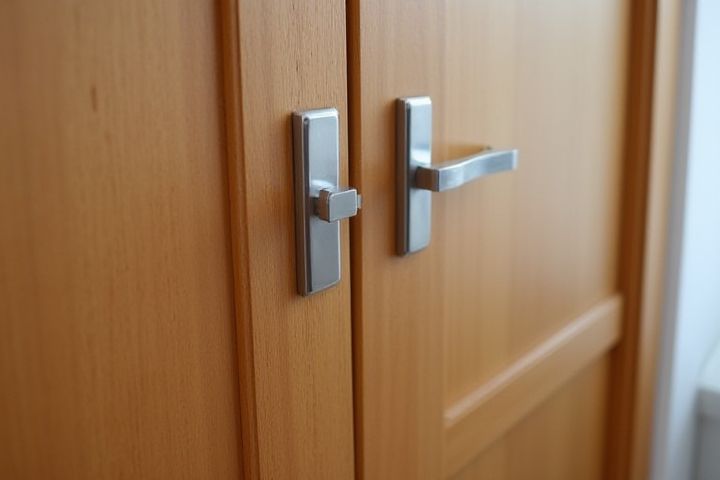
Yes, house doors can be effectively soundproofed to minimize noise intrusion. Various methods include installing solid core doors, which are denser and better at blocking sound than hollow core options. Weatherstripping and door sweeps can seal gaps around the door, preventing sound leaks. Acoustic panels or blankets can be applied for additional sound absorption, enhancing your home's overall quietness. Considering these options can significantly improve the sound insulation in your living spaces.
Can House Doors Be Soundproofed
Material selection for door core
Yes, house doors can be effectively soundproofed through the careful selection of materials for the door core. Solid core doors, typically made from materials like steel or a dense composite, significantly reduce sound transmission compared to hollow core doors, which may allow more noise to permeate. A door with a minimum thickness of 1.75 inches and a weight of 30-40 pounds can further enhance sound insulation properties. Additionally, incorporating materials such as like acoustic foam or recycled rubber within the core can maximize sound absorption, making your living space quieter and more peaceful.
Sealing gaps and edges
To effectively soundproof house doors, focus on sealing the gaps and edges with materials designed to block sound. Use weatherstripping or door sweeps to eliminate any spaces where sound can penetrate, particularly at the bottom and sides of the door. Acoustic caulk is also an excellent choice for filling in small cracks around the frame, ensuring a tight seal. Investing in these soundproofing techniques will significantly reduce unwanted noise, enhancing your home's tranquility.
Acoustic door sweep
Acoustic door sweeps effectively reduce sound transmission, making them essential for soundproofing house doors. These specialized sweeps feature dense materials designed to create a tight seal at the bottom of your door, blocking noise from entering or escaping the room. A well-installed acoustic door sweep can reduce noise levels by up to 50%, providing a quieter living environment for you. For optimal results, combine an acoustic door sweep with other soundproofing methods, like weatherstripping or solid-core doors, to enhance your home's acoustic performance.
Soundproofing door panels
Soundproofing door panels can significantly reduce noise transmission in your home, enhancing your overall comfort and tranquility. Using materials like mass-loaded vinyl can add mass and density to your existing doors, effectively blocking sound waves. Furthermore, installing a solid core door can provide a better sound barrier compared to hollow core doors, as it typically has an STC (Sound Transmission Class) rating of 30-35. You can also improve soundproofing by sealing gaps around the door frame with weatherstripping or acoustic sealant, ensuring there's no escape route for sound.
Use of heavy-duty door frame
Soundproofing house doors can be significantly enhanced by using a heavy-duty door frame. These robust frames, often made of solid materials like steel or reinforced wood, help minimize sound transmission between spaces. Installing high-density weather stripping along the edges of the door further enhances sound insulation, creating a more effective acoustic barrier. For optimal results, consider choosing a door weighing at least 50 pounds, as this added mass contributes to noise reduction.
Weatherstripping application
Soundproofing house doors can significantly reduce noise transmission, with weatherstripping being an effective solution. By applying high-quality weatherstripping materials, you can seal gaps around the door, minimizing sound leaks. For optimal results, ensure the weatherstripping is at least 1/8 inch thick and made from materials like foam or rubber, which effectively absorb sound. Proper installation of weatherstripping can reduce noise levels by up to 10 decibels, providing a quieter and more serene indoor environment.
Soundproofing blankets or curtains
Soundproofing blankets or curtains can significantly enhance the acoustic insulation of house doors. By strategically hanging these specialized fabrics over your door, you can reduce noise infiltration from both outside and adjacent rooms. These materials are designed to absorb sound waves and minimize echo, creating a quieter and more serene living environment. For the best results, ensure that the blankets or curtains completely cover the door and seal any gaps to maximize their soundproofing effectiveness.
Mass-loaded vinyl installation
Mass-loaded vinyl (MLV) serves as an effective soundproofing solution for house doors, significantly reducing noise transmission. By installing MLV directly onto the door surface or within the door frame, you add mass that helps block sound waves from passing through. This acoustic barrier is typically available in rolls, allowing for customizable sizes to fit any door. To maximize the soundproofing effect, ensure a tight seal around the edges using caulk or door sweeps, preventing sound leakage.
Threshold seal enhancement
Threshold seal enhancement is a crucial factor in soundproofing house doors, as it effectively reduces noise infiltration. High-quality threshold seals can block up to 95% of airborne sound, depending on the material and installation quality. When upgrading your door's threshold seal, consider options made from dense rubber or composite materials for optimal performance. Ensuring a snug fit between the door and seal contributes to a significant decrease in noise transmission, enhancing your overall acoustic comfort.
Laminated soundproof glass
Laminated soundproof glass is an effective choice for enhancing the soundproofing of house doors, minimizing external noise by up to 30 decibels. This specialized glass consists of two or more layers of glass bonded together with a sound-dampening interlayer, which significantly reduces sound transmission. For optimal soundproofing, consider applying this glass in a solid door frame, ensuring a tight seal to prevent sound leaks. By investing in laminated soundproof glass, you can create a more peaceful living environment, allowing you to enjoy serene space without distractions.
